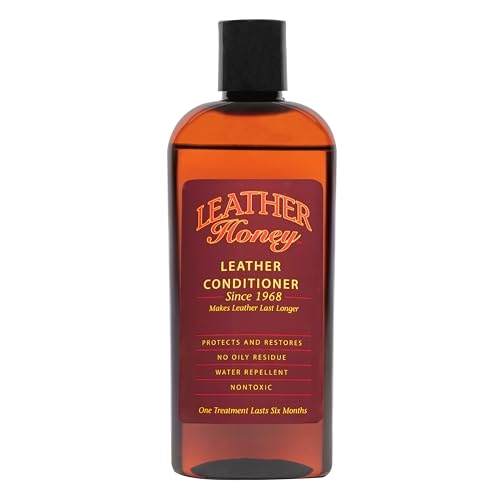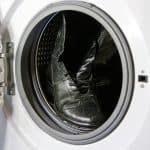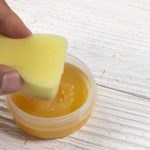It can be embarrassing to wear a loud leather jacket that creaks and squeaks with every tiny movement. In this article, you will learn about the reasons why leather jackets make this noise and how to stop it.
Why does my leather jacket squeak?
The main reason why anything squeaks is because of friction. If the material on your leather jacket is dry or incredibly smooth. It can switch from sticking and sliding rapidly, which causes an audible frequency we know as squeaking. Faux leather is also prone to squeaking as plastic can be quite smooth and can stick to itself.
Dry leather
When leather is dry, it won’t have enough oils sitting on the surface to make it smooth and supple. The oils provide moisturization and a layer of lubrication to make it soft. This is common on old leather jackets that haven’t been taken care of for a while.

If your leather jacket is old and squeaky, it might be time to give it a little conditioning. Some people don’t mind squeaky jackets and actually embrace this quirk. This is a normal thing and shouldn’t necessarily be a problem unless it bothers you.
New leather
New leather can be incredibly smooth and slick. If you’ve ever been to a basketball game and noticed how the players’ shoes squeak on the incredibly shiny surface, that’s because the coefficient of friction is in the right place for the materials to alternate between sticking and sliding fast enough to make a sound.
Squeaking is also quite common on high-quality leather jackets as pure leather can be quite thick and smooth. Cordovan is especially prone to squeaking.
Faux leather
Faux leather is made of plastic, and plastics aren’t really known for their capacity to hold moisture. Nor are plastics natural like leather that have pores to absorb and retain oils.
Because of this, faux leather tends to have a higher coefficient of friction than real leather. This can cause squeaking and sticking. This can also happen to genuine leather products that use a layer of plastic to mimic higher-grain leather.
How to fix a squeaky leather jacket
If you want to silence a squeaky leather jacket, you’ll have to lower the coefficient of friction to make the material slide against each other without sticking. There are a few ways to do this, and we’ll show you ways to fix both real leather and faux leather.
Conditioning your old leather jacket
If your leather jacket is old, it’s best to use conditioner. The reason why it’s squeaking is most likely because the leather has become dry and the fibers are very tight.
Leather conditioning products
For old leather jackets, it’s hard to go wrong with products specifically made to take care of leather and make them fresh again. You might not have one ready at your home, but it’s quite easy to find at shopping malls or even the grocery.
This is the safest option and you should probably go with a leather conditioner if you can go out of your way to buy one.
- POWERFUL LEATHER CONDITIONER: Leather Honey penetrates deep to protect new leather and rejuvenate...
- RESTORE ALL TYPES OF LEATHER: Soften & moisturize leather furniture, car seats, shoes & belts. Great...
- NON-STICKY, ODORLESS, WATER REPELLANT FORMULA: Protect your leather all year long from snow & rain....
You can condition your leather jacket with things you might already have at home. These methods may also work on new leather jackets.
Coconut oil or olive oil
These oils are very common and can be found in most homes. If you don’t have this at home, you could even use vegetable oil or any natural oil. However, you should do some research beforehand and smell the product to make sure that it doesn’t damage the leather or become uncomfortable to touch or smell.
Beeswax and other leather waxes
Waxes like Cobbler’s beewax are a great way to make your leather jacket water-resistant. However, what we’re after is reducing the friction on the material to prevent squeaking noises and that’s exactly what waxes can do for your leather jacket.
Some waxes like lanolin are great at conditioning your jacket as well, making it soft and supple.
Massaging your new leather jacket
New leather jackets can be quite stiff as the leather fibers are still fresh from the tannery and aren’t used to movement yet. These stiff fibers can have a high amount of friction and will cause squeaking.
You will need to break in your leather jacket, and one of the ways you can do this is by wearing it or massaging it. Working the fibers and softening them manually is a way to stop your new leather jacket from squeaking.
You might want to check out how to break in your new leather jacket as you may be facing some problems that are common on new leather jackets.
Talcum powder
Just like how it can make baby powder incredibly soft and smooth, it can do the same for your leather jacket. You can sprinkle a conservative amount on the parts that have high friction like the inner arms and pit area. This would be best used on faux leather jackets as the powder won’t dry out the synthetic material as much as real leather.
- Luxury talc
- Classic fragrance
- Delicate formula
If you want to avoid putting too much by accident, you can pour it on your hands instead and rub them together. You can then rub your hands on the places that rub against each other the most. You don’t have to get it on the entire jacket, and we would advise you not to do so as it can dry out the leather.
Talc’s safety has been questioned as of late, and we would like you to know that it may be unhealthy to inhale this powder. Please wear a mask and apply it in a well-ventilated area to protect yourself from inhaling it.
We also would not advise using this on old leather jackets that have not been conditioned properly as it can make the problem worse over time and dry out the leather jacket even more.
Mineral oil for faux leather
Mineral oil is not very good for genuine leather, but it is great for faux leather. Mineral oil is very slippery and does not degrade plastics. It also doesn’t smell and isn’t as uncomfortable to the skin if you end up touching it.
To apply mineral oil, you can wear plastic gloves and rub the mineral oil all over your hands. You can massage it over the areas that rub against each other and make squeaking noises. You don’t need to put a lot, it’s best to use as little as possible and use a thin layer.
One great benefit that mineral oil has is that it has UV protective qualities. You could coat your entire jacket and it would provide some protection against the sun. This could delay the faux leather from peeling and prolong the life of your jacket as direct sunlight can degrade faux leather.
Things to avoid
There’s a lot of advice out there, and some of them could be dangerous to your leather jacket. Here are some things you shouldn’t do.
Washing machine or dryer
The washing machine and dryer are too harsh for leather jackets. No matter what anyone says, avoid using the washing machine as much as possible. There are cases where it is okay to use a washing machine, but it should never be at the top of anyone’s list for washing or stopping squeaks.
Petroleum jelly
Petroleum jelly isn’t an ideal condition product for genuine leather. It’s even worse for faux leather as petroleum-based products can destroy plastics and degrade them. Avoid using this for any type of material.
Water
Water doesn’t really help when preventing squeaks. It will help, but only for a very short time. It’s also best to avoid getting your leather jacket wet. Water is very unnecessary when it comes to stopping your leather jacket from squeaking.
Conclusion
Whether it’s new, old, or faux leather jackets, it can be annoying to feel and hear the squeaking noises. Imagine being in a cinema and making that noise just by moving a very tiny bit. Unless you like the squeaking, there are ways to fix that noise.
We hope this guide has helped you silence your jacket and allow you to wear it without being embarrassed.
FAQ
Should a leather jacket squeak?
Squeaking is quite normal and common on leather jackets. Especially shiny and thicker types of animal hide like cordovan. You should avoid cordovan if you don’t like squeaking noises as eventually, it will start squeaking again. Suede jackets don’t squeak as much or at all as the fibers are softer and the fuzzy texture prevents them from squeaking. However, you can use oils and conditioners to stop any jacket from squeaking, no matter what it’s made of.
Should I spray my leather jacket?
Spraying a light mist of water on your leather jacket to stop it from squeaking is a very temporary solution. The water will evaporate quite quickly and it might even make the squeaking worse.
Spraying water on your leather jacket isn’t recommended either as you could saturate the leather with too much water if you aren’t careful and conservative. This could cause mold to grow and when the water evaporates, it will dry out the leather and make it stiff. Stiff leather is even more prone to making noise.








